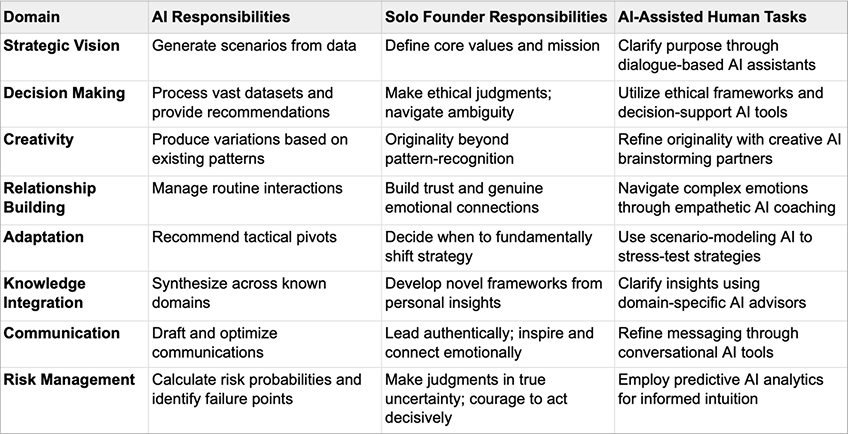The Revenge of the Generalist: AI and the Rise of Polymaths
How the rise of AI specialists creates a new era of opportunity for human generalists.
I recently celebrated the five-year anniversary of my company, Religion Studio, hitting our growth targets and a seven-figure revenue milestone for 2024. Honestly, it required me to wear a ridiculous number of hats: business strategy, product management, project management, engineering, design, accounting, legal, even watering the office plants. The idea of applying for a traditional job now feels borderline absurd. How do you even squeeze yourself back into one narrow lane after you've driven all over the map?
Previously, I explored how billion-dollar unicorn startups could soon be founded by individuals who orchestrate a team of specialized AI agents. AI is rapidly mastering specialized tasks like coding, marketing optimization, sales outreach, financial analysis - tasks that humans have traditionally dominated.
If AI excels at specialization, where does that leave humans?
The Rise and Fall of Generalists
Historically, generalists were celebrated. Leonardo da Vinci painted masterpieces, designed innovative machines, and studied anatomy. Benjamin Franklin wrote, invented, engaged in diplomacy, and shaped political thought. Polymaths weren't anomalies—they were admired precisely because they navigated multiple disciplines with ease.
But the Industrial Revolution shifted the world dramatically. Mass production required specialized labor. Workers performed repetitive tasks on assembly lines. The web and software boom later intensified this trend, rewarding deep, narrow expertise as human knowledge grew exponentially. The ideal professional became "T-shaped," deeply specialized with just enough broad awareness to avoid embarrassing themselves in team meetings.
The Generalist's Dilemma
My experience as a founder defies this specialization. Over the past decade, despite deep expertise in engineering and product management, I've become an accidental generalist. I've learned QuickBooks well enough to challenge accountants, navigated contracts and legal documents fluently, managed PEO systems, and overseen complex design and technical projects. Yet paradoxically, if I tried applying for a specialized job today, my breadth would likely be seen as a liability rather than an asset. Recruiters want neatly packaged specialists, not someone who's done a bit of everything.
AI Changes the Game
Now enter AI, the ultimate specialist. Anthropic’s Model Context Protocol (MCP) enables specialized AI agents to collaborate seamlessly:
Strategy agents: analyze market opportunities.
Development agents: produce efficient, error-free code.
Marketing agents: optimize campaigns down to the last detail.
Financial agents: manage budgets and forecasts effortlessly.
These AI specialists can outperform human experts in narrowly defined tasks. Let them have those jobs.
A Generalist Advantage
Imagine a generalist founder leading a new AI-driven consumer product startup. Specialized AI agents deliver detailed insights:
The marketing AI highlights a rapid decline in user engagement.
The financial AI flags potential cash flow issues due to increasing customer acquisition costs.
The development AI suggests a more efficient coding framework.
Each specialized AI offers clear, actionable advice within its narrow domain.
However, none recognize the underlying connection: the declining engagement stems from a subtle yet significant UX shift introduced by recent code optimizations. The financial AI can't detect this UX problem; the marketing AI sees only metrics, not user experience nuances; the development AI only focuses on efficiency, not user perception.
Only a generalist founder, someone who understands UX, software architecture, financial dynamics, and user psychology, can spot the interlinked issue. Recognizing this, the founder quickly rolls back the UX changes, adjusts the code optimization strategy, and reallocates budget to improve customer experience. Engagement rebounds, cash flow stabilizes, and the product regains momentum. This synthesis of insights across specialized domains is precisely what generalists do best.
The New Renaissance Leader
This shift actually opens space for generalists to reclaim their value. Humans thrive in areas AI struggles with, like creative vision, synthesis across disciplines, nuanced ethical judgments, emotional intelligence, and strategic imagination.
The billion-dollar unicorns of tomorrow won't be driven by specialists, they'll be led by cross-domain generalists who orchestrate AI specialists, setting clear visions, creatively solving problems, and keeping AI aligned toward meaningful goals.
Preparing for the AI-Enhanced Generalist Future
Even in areas that remain deeply human, like ethical judgment, emotional leadership, and creative vision, generalist founders won't operate alone. Emerging AI tools and language models will become crucial partners, enhancing the founder's unique strengths. Imagine an AI assistant trained specifically to help you navigate ethically ambiguous situations, or an emotional-intelligence AI guiding you through complex human dynamics.
Division of Labor: What AI Handles vs. What the Solo Founder Must Do
Preparing for this collaborative future will lead to entirely new product categories built specifically around the solo founder. Just as enterprise SaaS revolutionized corporate functions, we might soon see the rise of a dedicated ecosystem supporting the AI-enabled generalist entrepreneur.
This democratization of powerful support systems raises an intriguing possibility: might entrepreneurship become accessible at scale, empowering more individuals to become founders themselves?
After decades of rewarding depth, true polymathic curiosity and breadth might finally regain their significance.
Welcome back, generalists.



